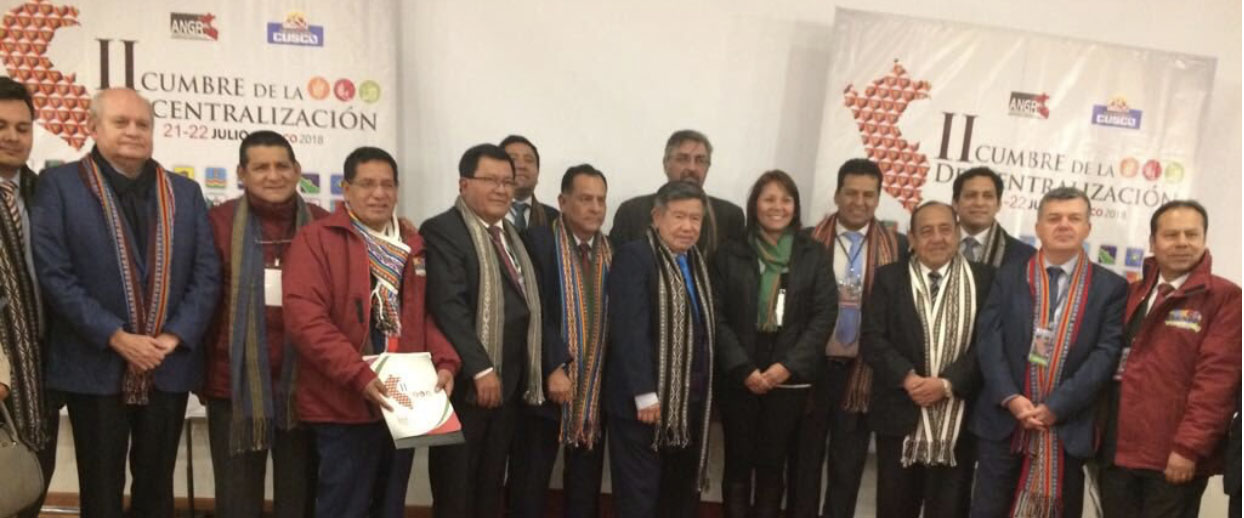Peruvian, Chilean and Uruguayan regions call for accelerated decentralization

With a meeting in Cusco on July 21 and 22 and a seminar in O'Higgins on July 23 and 24, the Peruvian and Chilean regions called for accelerating the decentralization of their respective countries.
The Second Summit on Decentralization with Zero Hunger, organized by the National Assembly of Regional Governments of Peru, brought together the country's governors and was attended by the Vice President, Mercedes Araoz, and the Prime Minister, César Villanueva. The governors called for the decentralization process to move forward, raising the need for progress on the fiscal sufficiency of the regions. ANGR President Luís Valdés asked for a ministry for decentralization, which will definitely drive the process forward.
The greatest forcefulness came, however, from the mayor of Cusco, Carlos Moncoso, who said, "There has been much talk of decentralization, but little has been done”. He showed a forceful opinion when he said that centralism being an evident failure, it was time for decentralization, which has the unanimous support of all Peruvians.
Vice President Mercedes Araoz picked up the gauntlet and ratified the Peruvian government's commitment to decentralization. Prime Minister Villanueva underscored this will, stating that "it was time to dismantle historical centralism".
Carles Llorens, secretary of ORU Fogar, after attending the event, was optimistic about Peru's expectations. He pointed to the status of former governors of the president and prime minister as an opportunity to be seized. "There is a firm commitment on the part of the government, they know how to proceed, but, above all, I think the governors are very empowered”.
The Chilean seminar, organized by the Regional Council and the O'Higgins University, was entitled "The challenges of change: decentralization and development" and was attended by regional councillors from all over the country.
All the debates were marked by the reform that will allow the provincial governors to be elected from 2020 onwards, as well as by the words of the President of the Republic, Sebastián Piñeira, who said he wanted to be the president of the decentralization, during his inauguration.
Marcelo Carrasco, president of the National Association of Regional Councillors ANCORE, said he welcomed the reform that will allow the election of regional governors, but said that the powers and funding remain with the presidential delegate. "These governors will only be presidents of the Regional Council and will not control more than 8-10% of the budget allocated to the regions," he explained.
The Secretary General, Carles Llorens, present at O'Higgins, encouraged the Chilean councillors to take advantage of the will expressed by the President of the Republic and was convinced that, once elected, the Chilean governors would acquire a political dimension that would irreversibly fill decentralization with content.
The XII Hemispheric Summit of Mayors and Local Governments, organized by FLAGMA and the Congress of Mayors of Uruguay, was held in Punta del Este, Uruguay, on August 30 and 31. The Secretary General of ORU Fogar, who participated in the event, highlighted the realization of an event that allows the meeting of mayors and governors from the local and regional world.
The meeting concluded that, in Latin America, decentralization is 'halfway'. Marne Osorio, president of the Congress of Mayors, pointed out that, in Uruguay, the process was being monitored by the Sectoral Decentralization Commission, in which ministers and mayors interact in order to concretize territorial policies. "The Congress of Mayors," he stated, "is the only instance capable of reaching cross-cutting agreements, overcoming not only management barriers, but also political and partisan barriers”.








































































